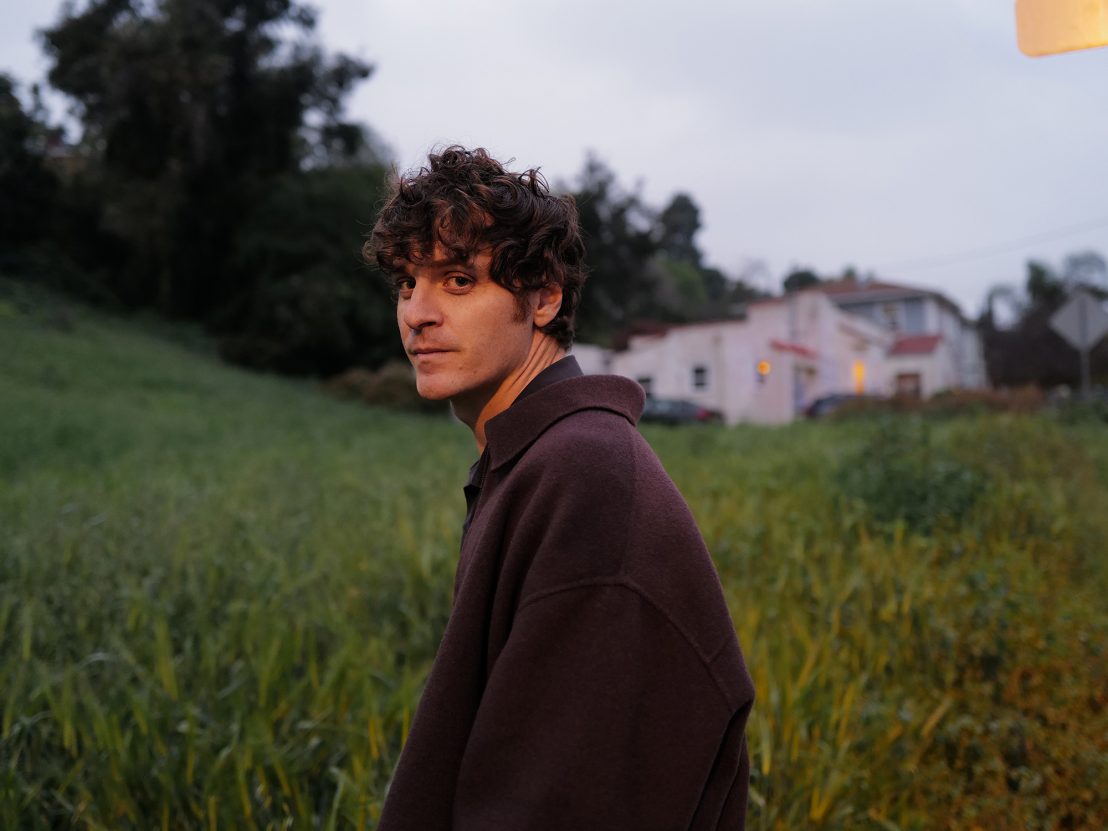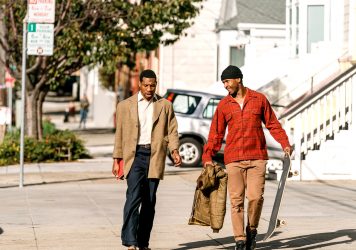
To celebrate the release of Emile Mosseri's new album, he sat down with old pal and collaborator Joe Talbot for a chat about Tupac, George Constanza, and swimming in LA lakes.
Best known for his complex, melodic film scores, the work of composer and musician Emile Mosseri has lifted the drama of a number of films into something almost spiritual – take Minari, Lee Isaac Chung’s story of Korean diaspora in rural America. The same can be said of one of his earliest film scores, The Last Black Man in San Francisco, a film directed by Joe Talbot. That collaboration changed the way they think about filmmaking and music respectively, and since then they have become close friends and creative partners.
They’ve collaborated again on a music video for “Greedy Heart”, a song from Mosseri’s new album, Heaven Hunters – his first studio album as a solo artist, full of vulnerable introspection (the music video is Talbot’s second, after Adele’s “I Drink Wine“). We facilitated a discussion with the two about what they learned from each other, chasing down a strange altered song discovered on Limewire, and taking dips in LA ponds.
Reductively speaking, I suppose your working relationship in the past has been you pulling from the images and composing from that, and this feels almost the inverse.
Emile Mosseri: It was very much an extension of our process and our dynamic. It was inverted in a way, but the line’s pretty blurry. Joe’s the most musical director I’ve ever worked with and he gets into the weeds and understands music in a way that’s really singular. So there’s an element of trust with him. I joke all the time about what a pain in the ass he is and how he’s a ball-buster, just he pushes everybody. He pushes the medium really far and it only works because there’s a trust. I trust that his notes are making the score better. He’ll push me to places that are out of my comfort zone in that medium too, and I think we push each other back and forth in a way, and then we’ll push back. The biggest distinction is with this video and with this album, this is my record and my vision.
With film scoring it’s safe, even if you’re making bold choices. With Last Black Man in San Francisco, Joe pushed me in that direction as he’s the director. So scoring films is very collaborative, which I love, but there’s a cushion there. Whereas with a record when you’re putting yourself out there and it’s your face and your voice, it’s way more vulnerable. So it was really fun to get together with Joe and make our album cover and make these press photos, show posters, the music video. That was a real gift and a real treat for me, and you want it to feel like yourself. You want to feel out of your comfort zone, but you also want it to feel like you.
So you spoke about pushing each other to do new things, but I since Emile struck out on his own with this – Joe, what’s your impression of the album itself?
Joe Talbot: I hear some of those melodic influences and even just in terms of the production on his album and what Bobby Krlic did, who produced it, they’re fun for me because it’s hearing something that I’m really familiar with in some ways. Some chord progressions, I thought, “that’s Emile and that sounds so much something we would write together.” But the reason it feels that way is because there’s a certain part of our shared musical love that Emile’s pulling from.
Whereas other corners of the album are more foreign to me, but still feels somewhat familiar because they come from the mind of someone that I know really well and that I’ve created within that space. Each song’s going to be some different combination of those things. I would love to do a video for every song on the album, and I don’t feel that way often.
What did you want to keep and what did you want to change from your experiences composing for film?
Mosseri: I feel like there’s things that I subconsciously kept. I think I had written and recorded this album after I’d scored a few films and I think, and Joe’s in a huge way mainly just pushed me to not be afraid of that line of being earnest.
I feel like, myself included, a lot of people in indie film and in indie music, like Joe has said before, can be afraid of being cheesy. So you sit in this safer space of ambience so no one’s going to hate it, but it might not move somebody as much. So I think a part of that found its way into the album, not in a calculated way, but just since I’m a different artist than I was before I started scoring.
And then what I wanted to do differently was, I guess, was to use lyrics and my voice. It’s not instrumental music. But I was also inspired by Joe’s movie and the films that I scored after Joe’s – Miranda July’s Kajillionaire and my friend Isaac’s Minari. All three of those films were pretty much ripping their hearts out and putting it on the big screen. It’s fearless and bold, and I wanted to do my version of that with the record.
Talbot: This is not fully related, but I was thinking but there’s a funny thing where I somehow feel some connection to those movies, even though I had no creative connection to them whatsoever. I imagine he might feel that way with some of the things that I work on outside of him. There aren’t a lot of collaborations in your life where you feel that way with someone where you’re not quite connected at the hip, but checking in with each other about the other things you take on because they affect each other’s lives in a funny way.
Mosseri: Yeah, no, I definitely feel that. I feel like you did have a hand in those projects too because we’re so close and you’re in my brain.
Talbot: I’m sorry about that.
Mosseri: I was in a band with two guys from when I was 15 years old to when I was 33, and when I write music, they’re also still always in there.
Talbot: Art is a certain point reflective of the people around us, people that challenge us or push us. My co-writer on my next film, she’s just brilliant, and Emile and I have gotten better too in the last several years and sharper in our collaboration and we’re more articulate and able to communicate better. Even though there’s one person that’s named the director, you’re always a product of the people around you who are pushing you in these interesting directions.
In terms of instrumentation, what did you get to experiment with on this album that you didn’t have a chance to in your scores?
Mosseri: I think a big part of that was working with Bobby Klich, who’s a close friend and brilliant artist. He scores films too, he scores Ari Aster’s films, he’s worked with Björk and Father John Misty and all these great artists. He and I met when I had lived with my songs for so long that I was too close to them, and I needed somebody like Joe to push me out of my comfort zone.
And Bobby, when I played him my demo of the album, he found moments that were instrumentally or orchestrally big that could be bigger, or moments that were intimate that could be even more stripped down. So he took my record and made it much more dynamic, alive and much more colourful.
I remember when Bobby sent me the first thing that he did. Before I even listened to it, I told myself, “OK, you’re gonna hate it, but you’ll learn to like it, you trust him” and I listened to it and I loved it instantly with that one. But there were others where like for the first 24 or 48 hours, I fucking hated what he did. But then it would become one of my favourite moments on the record! It only works if you trust somebody. I mean, Joe, as a director this is probably what you’re dealing with times 1000. You ever feel like that?
Talbot: There’s a weird disconnect sometimes between what will work really well for a scene sometimes versus what melody I like. Emile and I write a lot of music before I ever shoot the movie. So he’s been writing music for the film that I’m making next. Once you shoot a film and you have the scenes in front of you, the scenes don’t lie and the music doesn’t lie. Emile and I are pretty good, I think, at distinguishing that.
But we’re in a funny space right now where I’m writing the script with my co-writer, and then sometimes I’m working on music with Emile, and sometimes his music is guiding the screenwriting, and other times the scenes are guiding what the music should sound like. It’s weird, like two unfinished pieces informing each other, we’re just following the feeling of what we like.
Typically a composer comes on at the very end of the process and writes music for a locked cut. But I do think that sometimes because of that, music feels less integrated into the films. What we’re doing, it’s more of a pain in the ass for Emile, but it’s fun, at its best hopefully you’re able to create something where the images and the music are driving the other at all times. And get something unique out of it.
In a similar sense we did our own version of the song in the video – in a lot of ways, it’s the same one that appears on the album, but we added these other sort of elements on top to drive parts of it forward. So it’s fun for people that I think will love Emile’s music and will listen to the album a lot to see the video because of that slight difference.
And honestly, the first time I ever thought about that was back in the Limewire days, there was a version of Tupac’s “Thugz Mansion” that when he references Miles Davis on that song had this like jazz sample that came in for a second. And I remember thinking “that’s so cool” when I was like 14, and then I’ve never been able to find that version again. It’s kind of like this! We shot the video and made a bespoke version of the song after we shot the video. And part of the reason we did is because then it helps massage the video in interesting ways. Also it was fun to see Emile light up doing it, it was like he was scoring his own music video.
Mosseri: I like to tease Joe and say he found a way to actually give me notes on my own record.
It was actually kind of the most fun part of the process, it elevated the video and I wouldn’t have thought to do that. Also that Tupac thing is amazing because it raises a big question: is the art all of ours?
This is maybe a random association. I used to see these jam bands play when I was a teenager. And there was this girl that would go to all these shows like at Irving Plaza in New York, she’d bring her own flute and she’d jam along with the band, in the audience, and she would be like [Emile mimes playing the flute] The stones it takes to do that. In a way, it’s like the guy adding that Miles Davis sample to the Tupac track.
Do you think you’d be interested in a Limewire edit of one of your songs?
Mosseri: Being on the other end I could see why people would be sensitive to it. The opposite of that is George Costanza going to the movies and, and, and screaming out “That’s gotta hurt!” when a boat explodes. And everybody laughs, so he becomes part of the movie and then he keeps going back to the theater. I think I would enjoy that if somebody said “That’s gotta hurt!”
Talbot: Basically what it comes down to, it’s just gotta be a good addition. Like with the person playing the flute, it’s sink or swim.
Speaking of swimming – I wanted to ask about the shot in the music video where you’re submerged in the water.
Mosseri: I went under, it was disgusting. The water was stinky, it smelled like duck farts. It was highly embarrassing and uncomfortable. [Laughs]
Talbot: He was in the water and there were all these like people sitting around and they were kind of like, “Oh man, what’s that guy doing?” And we were really ragtag, we just had one, 16mm camera and there were about four of us. So it didn’t look like some big production, it just looked really desperate and kind of strange. But also you’re in LA and there’s a lot of desperate and strange going on all the time. So people were kind of rolling their eyes but then Emile got out smelling really bad.
And this guy goes [Joe does a stoner voice] “Hey man, are you Emile Mosseri? I love your music.” I thought, “Oh man, that’s gotta be brutal”, But Emile was really touched by it because the guy was such a fan, so it was actually really sweet.
Mosseri: It was like a gift from God. That happened when I was at my most vulnerable. Being recognized, for me it’s not a nuisance, it’s more of a highlight with where I am in my career. It’s not like I’m getting hassled on the street.
So people were taking out their phones, filming me in the water around there like, “Oh my God, I can’t believe this fool is getting into this water”, you know, and I’m trying to look cool and shit in the water and just trusting Joe and Gemma, the DP, that it’s gonna look beautiful.
Talbot: I think there’s a really good version of this video that might pop up one day online where someone adds in the cell phone footage. That’s their Tupac version of it.
Mosseri: I would rather not have to see that version.
Talbot: That’s why we’re lucky we had Gemma, who actually made it look a bit like heaven. I don’t think the cellphone footage looks nearly as dreamy as what she was doing.
Mosseri: It’d look like a guy stomping around in a lake also Joe kept on being like “I didn’t tell you to put your head under, that’s fucking gross, what are you doing?” Since I also had this old guitar underwater and it would fill up with water and sort of capsize me. But it did kind of create this cool effect where for the last shot there’s this sort of circular ripples that are just sort of emanating from me, like a beating heart, and that’s because the guitar was creating bubbles. So if I were you Joe, I would just tell people I thought of that.
Talbot: I missed a real opportunity there.
Emilio Mosseri’s debut solo album, Heaven Hunters, is out June 9.
Published 7 Jun 2023

By Elena Lazic
Bay Area native Jimmie Fails stars in this sentimental semi-autobiographical drama from director Joe Talbot.

This gorgeous semi-memoir filters the ragged glory of the American Dream through a family of South Korean immigrant farmers.

Miranda July channels her offbeat brand of humour into a heist movie, with predictably charming results.